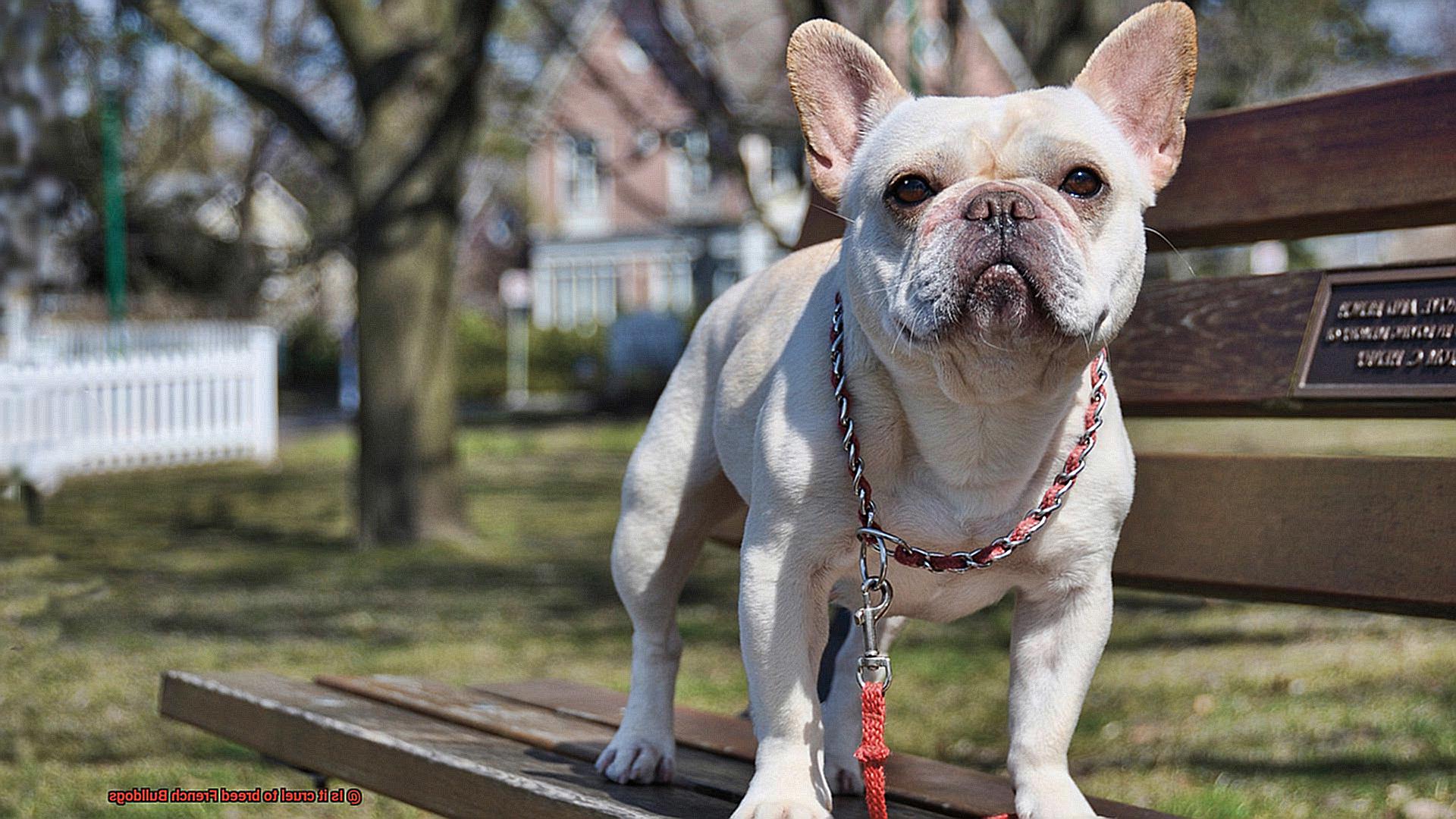Is it cruel to breed French Bulldogs?
You’re thinking about breeding French Bulldogs, huh? Those squishy faces and sweet personalities can certainly tug at your heartstrings. But before you dive headfirst into this adorable adventure, it’s important to consider the ethical implications that come with it.
Are we being kind to these furry friends by bringing more of them into the world? Or are we inadvertently subjecting them to a life of suffering? Let’s untangle this complex debate together.
In this blog post, we’ll unravel the multifaceted nature of breeding French Bulldogs. We’ll explore both sides of the argument, from the perspectives of experts and regular dog lovers like you and me. By doing so, we hope to shed light on this controversial topic and help you form a well-rounded understanding of whether it’s cruel or caring to breed these lovable pups.
On one paw, proponents argue that responsible breeding programs can actually improve the overall health and well-being of French Bulldogs. By carefully selecting which dogs mate, breeders can work towards eliminating hereditary health issues that plague these cuties—like those pesky respiratory problems and spinal disorders. Plus, when done right, breeding ensures that Frenchies grow up in safe environments with plenty of love, socialization, and top-notch veterinary care.
But hold your leash—there’s another side to this story too. Concerns have been raised about the exploitation and cruelty associated with breeding French Bulldogs. The breed’s popularity has skyrocketed in recent years, leading to an increase in demand for these wrinkled wonders. Unfortunately, this surge in demand has also given rise to unscrupulous breeders who prioritize profit over animal welfare. As a result, many Frenchies end up living in miserable conditions with genetic abnormalities and a long list of health problems.
Critics argue that breeding French Bulldogs—and other brachycephalic breeds—is inherently cruel due to their unique physical characteristics. With their flat noses and narrow windpipes, Frenchies often struggle to breathe, overheat easily, and have trouble with exercise. These health issues can be costly to treat and significantly impact the quality of life for these beloved pets.
To truly grasp the moral implications of breeding French Bulldogs, we need to consider a balanced mix of perspectives. Responsible breeders who prioritize the breed’s well-being and address hereditary issues are out there, but we can’t ignore the rampant commercialization and shady practices within the industry.
What is a French Bulldog?
Contents
- 1 What is a French Bulldog?
- 2 Health Issues Associated with Breeding French Bulldogs
- 3 Financial Implications of Breeding French Bulldogs
- 4 Irresponsible Breeding Practices for French Bulldogs
- 5 Market Demand for French Bulldogs and Its Impact on Breeding Practices
- 6 The Need for Dog Rescue Organizations and Shelters Due to Breeding French Bulldogs
- 7 Responsible Breeding Practices for French Bulldogs
- 8 Risks Involved with Breeding French Bulldogs
- 9 Conclusion
Originating in England but gaining popularity in France, these canines possess a distinctive appearance that sets them apart from other breeds.
Physically, French Bulldogs boast a stocky and robust build. Their broad chest and short, sleek coat contribute to their compact and sturdy appearance. However, it is their unique facial features that truly captivate attention.
French Bulldogs possess a short, flat face and bat-like ears that stand erect on their head, instantly making them recognizable. With a wide array of colors and patterns, including brindle, fawn, cream, and pied, there is a French Bulldog to suit every taste.

Beyond their charming looks, French Bulldogs possess a friendly and affectionate temperament that makes them superb companions for individuals and families alike. These dogs are renowned for their loyalty, playfulness, and compatibility with children. They thrive on human interaction and relish being involved in their family’s daily activities.
Despite their small size, French Bulldogs exhibit an energetic personality and enjoy physical activities such as short walks or playtime in a secure backyard.

However, it is important to note that due to their brachycephalic (short-faced) structure, they can be more susceptible to respiratory issues and overheating. Owners must vigilantly monitor their activity levels and provide them with ample water and rest to ensure their well-being.
Intelligence is another trait that French Bulldogs possess, although they can sometimes display stubbornness. With proper training and socialization from an early age, these clever canines can become well-mannered companions. Positive reinforcement methods involving treats and praise work effectively with them.
In terms of grooming needs, French Bulldogs have a short coat that requires minimal maintenance. Regular brushing helps keep their coat clean and healthy. Additionally, cleaning their facial wrinkles regularly is crucial to prevent infections. Trimming their nails and cleaning their ears on a regular basis are also essential for maintaining their overall hygiene.
French Bulldogs are well-suited for apartment living due to their small size and do not require excessive exercise. However, they do need mental stimulation and human interaction to prevent boredom and destructive behavior. Engaging them in interactive play and providing them with puzzle toys can help keep their minds sharp and content.
While French Bulldogs make wonderful pets, it is important to consider the potential health issues associated with the breed. Their unique anatomy makes them more susceptible to respiratory problems, eye conditions, dental issues, and overheating. Responsible breeding practices that prioritize the health and well-being of the dogs can help mitigate some of these concerns.

Health Issues Associated with Breeding French Bulldogs
French Bulldogs are undeniably adorable, with their bat-like ears and squishy faces, but it’s important to be aware of the health issues that can arise from breeding them. These health issues are often a result of the breed’s unique characteristics and genetic predispositions. Let’s take a closer look at some of the common health issues associated with breeding French Bulldogs.
First and foremost, brachycephalic syndrome is a major concern for French Bulldogs. This condition refers to the shortening of the skull, which can cause breathing difficulties and respiratory problems. Due to their cute squished faces, Frenchies are more prone to this condition than other breeds. Imagine having a stuffy nose all the time – not fun.
In addition to brachycephalic syndrome, French Bulldogs also suffer from brachycephalic obstructive airway syndrome (BOAS). Their airways are narrow and easily get blocked, leading to snoring, labored breathing, and trouble cooling themselves down in hot weather. So make sure to keep them cool and comfortable during those scorching summer months.
Heat stroke is another major concern for our French Bulldog friends. Their compromised respiratory system makes it hard for them to regulate their body temperature, so they’re at a higher risk of overheating. Keep a close eye on them in hot climates or during intense physical activity, and make sure they have access to plenty of shade and water.
Now let’s talk about those precious eyes. French Bulldogs are prone to various eye problems, including cherry eye (when the third eyelid gland pops out), corneal ulcers, and cataracts. These can cause discomfort and vision issues, so regular check-ups with an eye specialist are a must.
And we can’t forget about their skin. Those adorable wrinkles can be a breeding ground for irritation and infection if not properly cleaned and maintained. Skin allergies are also quite common in Frenchies, leading to itchiness, rashes, and hair loss. So make sure to keep those wrinkles clean and dry, and consult with your vet about any signs of allergies.
Skeletal disorders are also a concern for French Bulldogs. Hip dysplasia and intervertebral disc disease can cause pain, lameness, and mobility issues. If your Frenchie starts showing signs of discomfort or difficulty moving, it’s important to consult with your vet to explore treatment options.
Last but not least, let’s talk about reproduction. Female French Bulldogs often require assistance with mating and may need artificial insemination. They also frequently encounter difficulties during labor and delivery due to their narrow pelvis and the large heads of their puppies. So if you’re thinking about breeding your French Bulldog, be prepared for potential complications and consider consulting with a veterinarian.
Financial Implications of Breeding French Bulldogs
If you’re lucky enough to own a French Bulldog, the idea of breeding these adorable pups may have crossed your mind. However, before diving into this venture, it’s crucial to understand the financial implications involved. In this comprehensive guide, we will explore the costs and considerations associated with breeding French Bulldogs, equipping you with the knowledge to make an informed decision.
Initial Investment:
- Purchasing a high-quality breeding pair can range from several thousand to tens of thousands of dollars. This includes considering the pedigree and reputation of the breeder.
- Health testing and genetic screening are essential to ensure the well-being of both parents and puppies, but they can add to the overall cost.
Ongoing Expenses:
- Veterinary care, vaccinations, grooming, and feeding should all be factored into your budget. French Bulldogs are known to have various health issues, which require regular medical attention and specialized care.
- The cost of maintaining a breeding program includes the expenses associated with caring for multiple dogs.
Time and Effort:
- Breeding French Bulldogs requires a significant dedication of time and effort. Proper care, nutrition, exercise, and socialization demand your attention and resources.
- Overseeing mating, managing pregnancies, and whelping puppies necessitates round-the-clock commitment.
Marketing and Advertising:
- Creating a professional website, attending dog shows or events, and utilizing online platforms may be necessary to promote your breeding program.
- These expenses contribute to finding suitable homes for your puppies and ensuring they go to responsible owners.
Market Conditions:
Irresponsible Breeding Practices for French Bulldogs
In this comprehensive article, we will delve into various common irresponsible breeding practices for French Bulldogs, shedding light on why selecting a responsible breeder is essential.
Overbreeding and its Health Ramifications:

One of the prevailing irresponsible breeding practices is overbreeding. Some breeders prioritize quantity over quality, resulting in health issues in the puppies. Female French Bulldogs bred too frequently without adequate recovery time experience physical and emotional stress, leading to a myriad of health problems for both the mother and her offspring.
Genetic Health Issues:
French Bulldogs are predisposed to genetic conditions such as brachycephalic syndrome, hip dysplasia, and spinal disorders. Irresponsible breeders may knowingly mate dogs with these conditions, disregarding the potential health risks to the puppies. This unethical practice perpetuates suffering and puts the puppies’ well-being at risk.
Inbreeding and Line-breeding:

Another irresponsible breeding practice is inbreeding or line-breeding, where closely related dogs are mated. Although this may be done to preserve specific traits, it significantly increases the likelihood of genetic disorders and health problems in the puppies. Responsible breeders meticulously consider the genetic diversity of their breeding stock, ensuring healthier offspring.
Appearance Over Health:
Some breeders prioritize appearance over the overall health and well-being of the dogs. Traits such as extremely short muzzles or excessive skin folds may be sought after but can cause breathing difficulties and skin problems in French Bulldogs. Responsible breeders prioritize producing healthy puppies with good temperaments rather than solely focusing on appearance.

Puppy Mills:
Notorious for their irresponsible breeding practices, puppy mills are large-scale commercial operations that prioritize profit over animal welfare. Dogs in puppy mills live in cramped and unsanitary conditions, resulting in numerous health and behavioral issues for both parent dogs and their puppies. Supporting responsible breeders helps combat the existence of these detrimental establishments.

Why Support Responsible Breeders:
By selecting a responsible breeder, you guarantee that the French Bulldog you welcome into your home is healthy, well-socialized, and free from genetic disorders. These breeders conduct thorough health screenings and limit the breeding frequency of their dogs to prioritize their well-being. Additionally, they provide adequate care and attention to their puppies, setting them up for a happy and healthy life.

Market Demand for French Bulldogs and Its Impact on Breeding Practices
However, the surge in market demand for these adorable dogs has had a profound impact on breeding practices. In this article, we will explore the consequences of this high demand and shed light on the importance of responsible breeding.
Quantity over Quality:

The increased demand for French Bulldogs has led some breeders to prioritize quantity over quality. This has resulted in unethical breeding practices, such as puppy mills where dogs are kept in deplorable conditions. These mass production methods compromise the welfare of the dogs, leading to numerous health issues in the offspring. Dogs bred in puppy mills often suffer from genetic disorders, respiratory problems, and behavioral issues.
Irresponsible Breeding Practices:
To meet the growing demand, breeders may engage in irresponsible breeding practices. Dogs may be bred at a young age or without proper health screenings, increasing the risk of genetic issues and health problems in the puppies. This can have long-term implications for the well-being of these beloved pets. Irresponsible breeders may also fail to provide adequate socialization and care for the puppies, leading to behavioral problems later in life.
The Lucrative Market:
The high market demand for French Bulldogs has created a lucrative market for unscrupulous breeders who prioritize profit over the welfare of the dogs. These breeders may cut corners on essential care and health checks, resulting in puppies with a higher risk of health issues. It is crucial for potential owners to be aware of these risks and do thorough research before purchasing a dog. By supporting responsible breeders who prioritize health testing, proper care, and ethical breeding practices, consumers can help ensure the well-being of these lovable companions.
Emergence of Designer Breeds:
The demand for French Bulldogs has also given rise to “designer breeds” or mixed breeds that resemble French Bulldogs. These mixed breeds are often bred solely for profit without considering their health or well-being. It is important to be cautious when considering purchasing these dogs, as their genetic makeup might increase their susceptibility to certain health issues. Responsible breeders prioritize the health and temperament of their dogs, ensuring a higher chance of having a healthy and happy pet.
Conclusion:
While not all breeders engage in unethical practices, the high market demand for French Bulldogs puts pressure on responsible breeders to meet the demand. This can result in compromised breeding standards and a higher likelihood of health issues in the puppies. By supporting responsible breeders who prioritize the health and well-being of their dogs or considering adoption from shelters, potential owners can help discourage unethical breeding practices and provide loving homes for these adorable companions.
The Need for Dog Rescue Organizations and Shelters Due to Breeding French Bulldogs
The growing popularity of breeding French Bulldogs has led to serious consequences for these beloved fur babies. In this article, we will explore why rescue organizations and shelters are crucial in addressing the issues caused by irresponsible breeding practices.
So, grab your Frenchies and let’s dig deeper into this important topic.
Health Issues:
Let’s address the elephant in the room – the health issues that plague French Bulldogs. These charming pups are genetically predisposed to various health problems, including respiratory issues, joint problems, and eye conditions. Sadly, some breeders prioritize profit over the well-being of these dogs, resulting in puppies with even more severe health issues. Consequently, owners find themselves unable or unwilling to bear the financial burden of caring for a sick French Bulldog.
Unethical Breeding Practices:
The surge in French Bulldog breeding has given rise to puppy mills and backyard breeders. These establishments prioritize quantity over quality, subjecting breeding dogs to deplorable conditions. The innocent victims, many of whom suffer from health issues due to irresponsible breeding practices, often end up in rescue organizations and shelters. It is devastating to witness these pups endure such cruelty.
The Role of Rescue Organizations and Shelters:
Fortunately, rescue organizations and shelters play a vital role in rescuing, rehabilitating, and rehoming French Bulldogs that have been abandoned or surrendered. These organizations provide essential care for these dogs, including medical treatment, socialization, and training. Their tireless efforts ensure that each dog finds a suitable forever home where they will receive the love and care they deserve.
Benefits of Adoption:

As responsible French Bulldog enthusiasts, it is crucial to consider adopting from rescue organizations or shelters instead of supporting irresponsible breeding practices. By doing so, you not only give a deserving dog a second chance at a happy life but also help reduce the demand for poorly bred puppies. Furthermore, you will experience the unconditional love and loyalty of a grateful pup who will forever be grateful to have found their forever home.
Responsible Breeding Practices for French Bulldogs
French Bulldog enthusiasts, listen up. If you’re thinking about breeding your beloved pup or welcoming a French Bulldog puppy into your family, it’s essential to understand the significance of responsible breeding practices.
These practices not only guarantee the well-being and vitality of these adorable companions but also contribute to the betterment of the breed as a whole. Let’s explore what it truly means to be a responsible breeder and how you can make a positive impact on the French Bulldog community.
First and foremost, responsible breeding starts with carefully selecting healthy parent dogs. French Bulldogs are susceptible to certain genetic disorders and health issues, such as breathing difficulties and joint problems. To minimize these risks, breeders must conduct thorough health screenings and genetic testing on their breeding dogs. This includes tests for conditions like hip dysplasia, patellar luxation, and brachycephalic syndrome. By ensuring that the parent dogs are free from these hereditary diseases, you’re establishing a solid foundation for healthy puppies.
But it doesn’t end there. Proper veterinary care is vital for breeding dogs. Regular check-ups, vaccinations, and preventive treatments for parasites keep them in optimal health throughout the breeding process. After all, healthy parents lead to healthy puppies.
Now, let’s focus on the mental and emotional well-being of these delightful creatures. Responsible breeders provide a safe and stimulating environment for their dogs, offering socialization opportunities, love, and attention. This not only promotes their overall happiness but also prevents behavioral issues. A well-rounded French Bulldog is a happy one.
Of course, responsible breeders possess a deep understanding of the breed standard. They strive to produce puppies that adhere to these standards in terms of physical traits, temperament, and overall breed characteristics. By doing so, they help maintain the integrity of the breed.
Ethical breeders go above and beyond when it comes to finding suitable homes for their puppies. They meticulously screen potential buyers to ensure they can provide a loving and responsible environment. Furthermore, they offer ongoing support and guidance to new owners, ensuring a lifetime of happiness for both the puppy and their human companion.
Responsible breeders know their limits. They refrain from overbreeding their dogs or engaging in unethical practices like puppy mills or backyard breeding. They limit the number of litters each breeding dog has and allow sufficient time between pregnancies for recovery. Quality over quantity is the key.
Transparency plays a crucial role in responsible breeding. Breeders should be open about any known health issues within their breeding line and provide accurate health records for their dogs. This enables potential buyers to make informed decisions and ensures the well-being of the puppies.
Risks Involved with Breeding French Bulldogs
Whether you’re considering breeding these lovable pups or already have one as part of your family, it’s imperative to grasp the risks involved.
Breeding French Bulldogs presents a myriad of challenges, both for our furry friends and for us as responsible breeders.
So, let’s delve into these potential risks to ensure the utmost health and happiness for our cherished Frenchies.
- Genetic Health Issues: Our delightful French Bulldogs are predisposed to a range of genetic health conditions, such as brachycephalic syndrome. This syndrome affects their breathing due to their adorable short snouts, leading to respiratory problems, exercise intolerance, and difficulties in regulating body temperature. By practicing responsible breeding and ensuring comprehensive health screenings and genetic testing, we can significantly diminish the risk of passing these conditions on to future generations.
- Birthing Complications: Owing to their distinctive body shape and size, French Bulldogs often encounter difficulties during natural childbirth. Many females require cesarean sections to safely deliver their precious puppies. These procedures can be financially burdensome and pose risks to both the mother and her offspring. It is crucial for breeders to be prepared for this possibility and work closely with experienced veterinarians well-versed in bulldog breeding.
- Other Health Issues: Alongside genetic concerns, French Bulldogs are prone to allergies, skin infections, eye problems, and joint disorders. Breeding without proper health screenings and genetic testing escalates the likelihood of passing on these conditions. To safeguard our pups, prioritizing the health of our breeding dogs by ensuring regular veterinary care is paramount.
- Irresponsible Breeding Practices: Unfortunately, the skyrocketing popularity of French Bulldogs has engendered an increase in unethical breeding practices like puppy mills and backyard breeders. These unscrupulous breeders prioritize profit over the well-being of the dogs, leading to a heightened risk of genetic health issues in the puppies they produce. By supporting responsible breeders and eschewing these unethical practices, we can make a positive impact on the breed’s overall health.
- Heat-Related Issues: French Bulldogs, with their charming brachycephalic features, are more susceptible to heatstroke and other heat-related problems. Their compromised ability to regulate body temperature renders them vulnerable in hot weather or stressful situations. As conscientious breeders, it is our duty to educate ourselves on techniques to keep our dogs cool and comfortable, especially during scorching summer months.
- Time, Effort, and Financial Resources: Breeding French Bulldogs necessitates a substantial investment of time, effort, and financial resources. Responsible breeders must provide proper healthcare, nutrition, socialization, and training for their breeding dogs and puppies. Neglecting these responsibilities risks both the physical and mental well-being of the dogs and perpetuates genetic health issues.
cMnxelBjWDU” >
Conclusion
In conclusion, breeding French Bulldogs can be considered cruel due to the numerous health issues they face.
The selective breeding practices that prioritize certain physical traits have led to a myriad of problems for these dogs. From respiratory difficulties to eye and skin conditions, French Bulldogs suffer from a range of ailments that greatly impact their quality of life.
Furthermore, the high demand for these dogs has resulted in irresponsible breeding practices, including puppy mills and backyard breeders who prioritize profit over the well-being of the animals.




